Experience the exhilaration of venturing into the great outdoors with your first backpacking adventure. How easy it is for first time backpacking?
As a first time backpacking enthusiast is fun and easy with the right tips, gears and advice, going backpacking in an unkwon trail is way too dangerous as a beginner.
Contents
Here are some helpful tips for first-time backpackers:
- Plan and Research: Before you head out, research your destination, trails, and weather conditions. Plan your route, know the regulations, and ensure you have the necessary permits.
- Choose the Right Gear: Invest in quality, lightweight gear suitable for the conditions. A comfortable backpack, sturdy boots, a good sleeping bag, and a reliable tent are essential.
- Pack Light: Limit your pack weight to about 20-25% of your body weight. Only pack what you truly need, and remember that multi-purpose items are your best friend.
- Food and Water: Carry enough food and water but be mindful of weight. Consider lightweight, dehydrated meals and a water filtration system to stay nourished and hydrated.
- Layer Clothing: Dress in layers, so you can easily adapt to changing weather. Avoid cotton, as it doesn’t insulate when wet. Opt for moisture-wicking and quick-drying materials.
- Map and Compass: Always carry a map and compass, and know how to use them. GPS devices and smartphone apps are handy but can fail or run out of battery.
- Leave No Trace: Practice Leave No Trace principles by packing out all your trash, staying on established trails, and respecting wildlife and vegetation.
- First Aid Kit: Carry a basic first aid kit for emergencies. Learn how to use it, and customize it to your specific needs.
- Trail Etiquette: Yield the trail to others, whether hikers, bikers, or equestrians. Keep noise levels down and be respectful of nature and fellow adventurers.
- Stay Informed: Let someone know your itinerary and expected return time. Check the weather forecast and be prepared for sudden changes.
- Wildlife Awareness: Learn about the local wildlife and their behavior. Keep a safe distance, store food securely, and never feed animals.
- Campsite Selection: Choose your campsites wisely. Camp at least 200 feet away from lakes and streams, and follow established camping regulations.
- Fire Safety: Follow fire regulations in the area you’re visiting. Carry a portable stove for cooking, and always use a campfire ring if fires are allowed.
- Hiking Technique: Take short, frequent breaks to prevent fatigue. Use proper hiking techniques, like walking with a straight back and using trekking poles.
- Enjoy the Journey: Backpacking is about the experience, not just the destination. Take time to appreciate the beauty of nature, the solitude, and the sense of accomplishment.
- Learn Basic Skills: Familiarize yourself with basic wilderness skills like navigation, water purification, and building a shelter in case of emergencies.
- Respect Nature: Stay on marked trails, avoid trampling on fragile vegetation, and minimize your impact on the environment.
- Practice Safety: If you encounter unexpected challenges or dangerous situations, don’t hesitate to turn back or seek help if needed.
- Group Size: Going with a friend or a group can be safer and more enjoyable, especially for beginners. Share the responsibilities and the experience.
- Perseverance: Backpacking can be physically and mentally demanding. Be prepared to face challenges, stay positive, and persevere.
Backpacking allows you to break free from the confines of traditional travel and immerse yourself in nature’s wonders.
This introductory guide will introduce you to the exciting world of backpacking for beginners, providing you with essential tips and insights to make your first trip a success.
First time backpacking! From selecting the right gear to planning your meals with backpacking stoves and meals, we’ve got you covered.
Get ready to embark on an unforgettable journey as you discover the freedom, adventure, and self-discovery that come with first-time backpacking.
First time backpacking
Embarking on your first backpacking adventure can be an exhilarating and transformative experience.
Whether you are venturing into the wilderness or exploring new cities, backpacking allows you to immerse yourself in the beauty of nature and embrace a sense of adventure.
However, as a first-time backpacker, it is important to be well-prepared and equipped with the necessary knowledge and gear to ensure a successful and enjoyable trip.
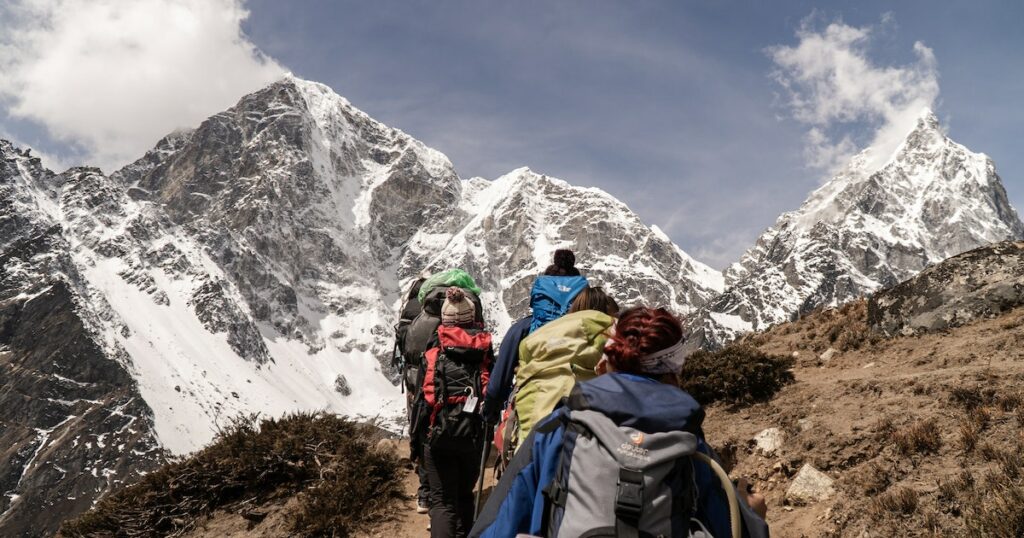
Essential Tips for Beginner Backpackers
To kickstart your backpacking journey, it’s crucial to learn from experienced backpackers who have already ventured into the great outdoors.
They can provide valuable tips and advice that will make your first-time experience much smoother. Listen to their stories, ask questions, and take note of their pro tips.
Stay safe and prepared
Safety should be a top priority when venturing into the wilderness as a beginner backpacker.
Make sure you are well-prepared by packing essential items such as proof bags to protect your gear from rain, a water bottle to stay hydrated, and a first aid kit in case of emergencies.
Familiarize yourself with the Leave No Trace principles to minimize your impact on the environment.
Master the art of packing light
As a beginner backpacker, it’s important to pack light and efficiently. Only bring the essentials that you truly need for your trip.
Opt for lightweight gear and clothing that can withstand different weather conditions. Remember, every ounce counts when you’re carrying everything on your back!
Essential skills and knowledge
Before embarking on your first backpacking adventure, equip yourself with basic skills and knowledge.
Learn how to set up a tent properly, navigate using a map and compass or GPS device, start a campfire safely, filter water from natural sources, and identify potential hazards in the wilderness.
By following these essential tips for beginner backpackers, you’ll be well-prepared for your first-time adventure into nature’s playground.
Remember to learn from experienced backpackers, prioritize safety and preparation, master the art of packing light.
And acquire essential skills and knowledge before setting off on your journey.
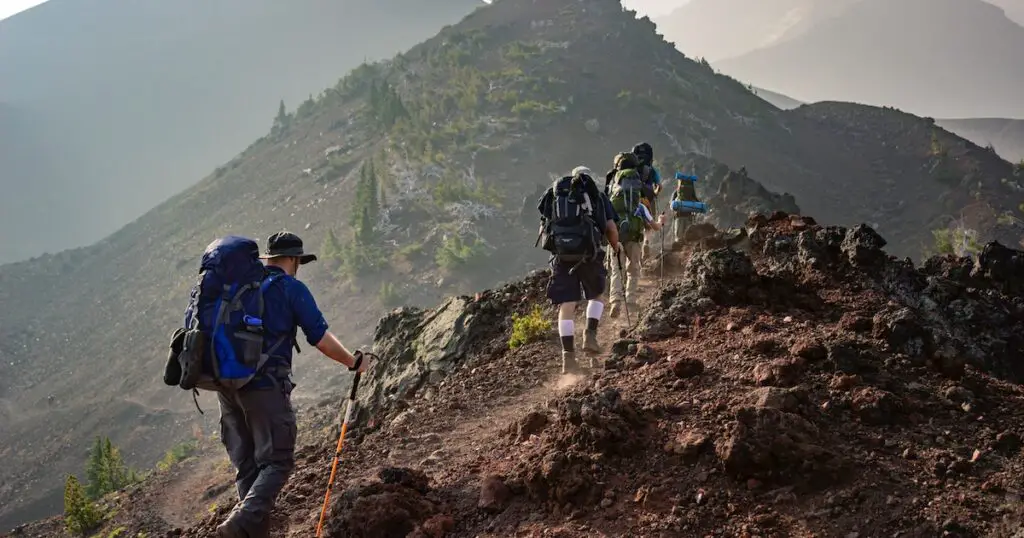
Avoiding Rookie Mistakes on Your First Backpacking Trip
Don’t make these rookie mistakes on your first-ever backpacking trip. It’s important to be prepared and knowledgeable before embarking on this exciting adventure.
Here are some common pitfalls to avoid during your initial venture into backpacking.
Lack of Proper Planning
One of the biggest mistakes new backpackers make is not planning adequately. Don’t just throw a bunch of gear in a bag and head out without a plan.
Research the trail you’ll be hiking, check the weather forecast, and familiarize yourself with any permits or regulations that may apply.
Overpacking
It’s easy to get carried away and pack everything but the kitchen sink for your first backpacking trip.
However, overpacking can lead to unnecessary weight and discomfort on the trail.
Pack only what you truly need, focusing on lightweight essentials such as food, water, clothing layers, and shelter.
Ignoring Physical Fitness
Backpacking involves long hours of walking with a heavy pack on your back.
Make sure you’re physically prepared for the demands of the trip by engaging in regular exercise beforehand.
Strengthen your legs, improve endurance, and practice carrying a loaded backpack to build up stamina.
Not Testing Gear Beforehand
New gear can be exciting to use, but it’s crucial to test it out before hitting the trail.
Set up your tent in the backyard, try out your stove at home, and make sure all equipment is functioning properly before relying on it in the wilderness.
Neglecting Leave No Trace Principles
When venturing into nature, it’s essential to leave no trace behind.
Follow Leave No Trace principles by properly disposing of waste, minimizing campfire impacts, respecting wildlife and vegetation, and staying on designated trails.
By avoiding these rookie mistakes during your first backpacking trip, you’ll have a smoother and more enjoyable experience in the great outdoors.
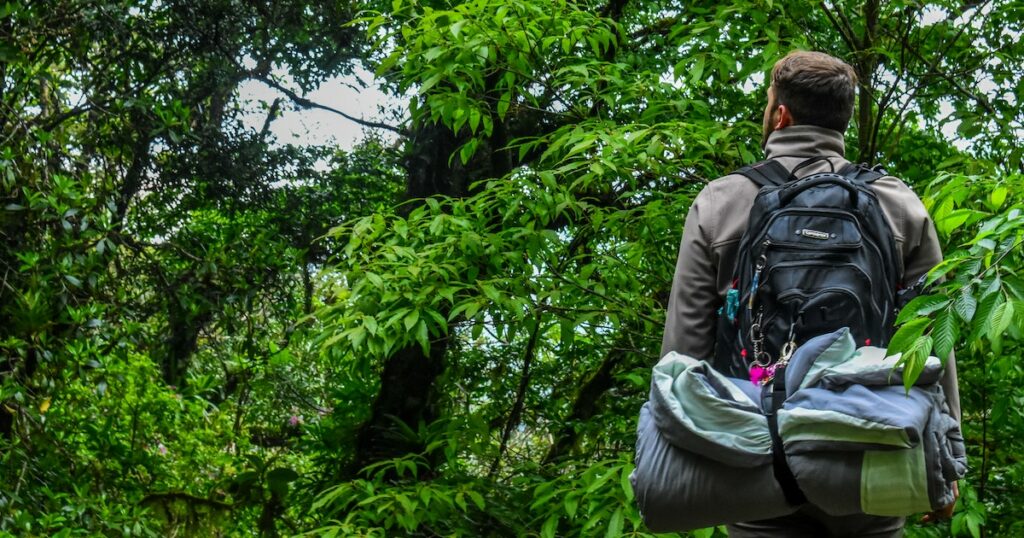
Planning Your First Backpacking Adventure
Planning your first backpacking adventure can be an exciting and exhilarating experience.
Whether you’re going on a solo backpacking trip or with a group of friends, proper planning is essential for a successful and enjoyable journey.
Here’s a step-by-step guide to help you plan your epic first-time backpacking adventure.
Choose the Perfect Destination
The first step in planning your backpacking adventure is selecting the perfect destination.
Consider factors such as the difficulty level of the trails, the weather conditions during your intended travel dates, and the availability of amenities like water sources and campsites.
Research different locations and gather information about their scenic beauty, wildlife encounters, and any permits or regulations required.
Map Out Your Routes
Once you’ve chosen your destination, it’s time to map out your routes.
Study trail maps, read guidebooks or online resources to understand the terrain and elevation changes along the trails.
Identify key points of interest such as viewpoints, lakes, or waterfalls that you’d like to visit along the way.
Create a Detailed Itinerary
Creating a detailed itinerary is crucial for a successful backpacking trip. Plan how many days you’ll spend on the trail, including rest days if necessary.
Break down each day into segments based on distance covered and elevation gain/loss.
Estimate how long it will take to reach each campsite or landmark so that you can pace yourself accordingly.
Make Necessary Arrangements
Before embarking on your inaugural backpacking adventure, make sure to make all necessary arrangements.
This includes reserving campsites if required, obtaining permits if needed, and ensuring you have all the necessary gear such as backpacking packs, tents, sleeping bags, cooking equipment, and food supplies.
Tips and Tricks for Effective Planning
To ensure effective planning for your first-time backpacking trip:
- Start with shorter trips to gain experience before attempting longer treks.
- Pack lightweight and essential items to minimize the weight of your backpack.
- Check the weather forecast before heading out and pack accordingly.
- Share your trip plan with a trusted friend or family member for safety purposes.
By following these steps and tips, you’ll be well-prepared for your first backpacking adventure.
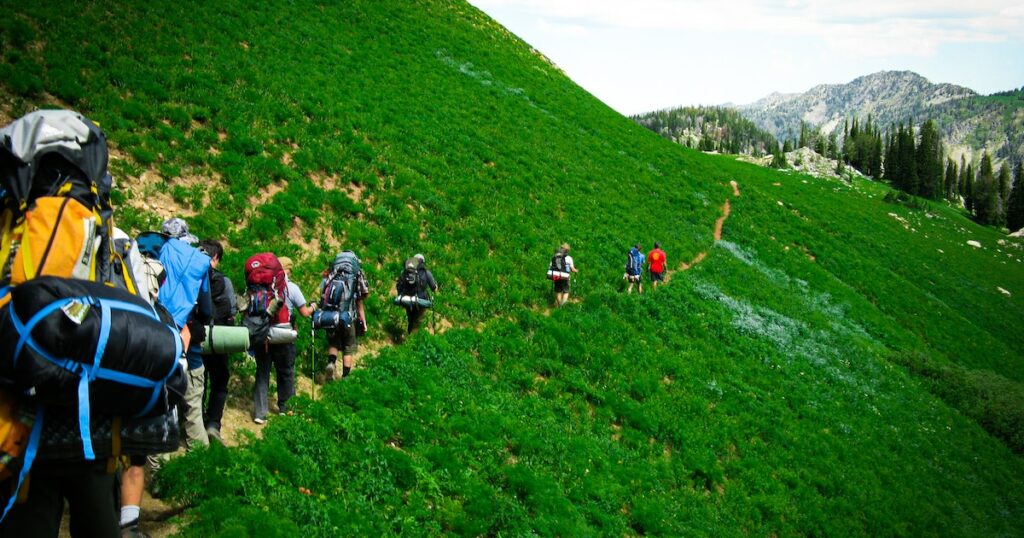
Choosing the Right Gear and Equipment for Beginner Backpackers
To have a successful first-time backpacking experience, it’s crucial to choose the right gear and equipment.
As a beginner, you want gear that is essential, reliable, and won’t break the bank. Here are some tips on selecting the perfect gear for your adventure:
The Ultimate Gear Guide: Essential Equipment for Beginners
- Start with a good quality backpack that fits comfortably on your shoulders and has enough space to carry all your essentials.
- Invest in a sturdy pair of hiking boots or shoes that provide proper support and traction on different terrains.
- Don’t forget a reliable sleeping bag that suits the climate you’ll be camping in. Look for one with insulation appropriate for the temperatures you expect to encounter.
- Consider bringing along a lightweight tent or hammock if you plan on camping overnight. Make sure it’s easy to set up and provides adequate protection from the elements.
Must-Have Gear Recommendations for Novice Adventurers
- Pack a basic first aid kit with bandages, antiseptic wipes, pain relievers, and any necessary prescription medications.
- Bring along a water filtration system or purification tablets to ensure access to clean drinking water during your trip.
- Don’t forget to pack extra layers of clothing suitable for various weather conditions. A rain jacket is especially important to keep you dry during unexpected showers.
- Consider investing in lightweight cooking gear such as a camping stove or mess kit if you plan on preparing meals outdoors.
Budget-Friendly Gear Options for Beginners
- Look out for sales or discounts at outdoor stores or online retailers where you can find affordable gear without compromising quality.
- Consider buying used gear from reputable sources like outdoor gear rental companies or online marketplaces. Just make sure to thoroughly inspect any used items before purchasing.
By choosing the right gear and equipment as a beginner backpacker, you’ll be well-prepared for your first adventure without breaking the bank.
Remember, it’s important to invest in reliable gear that will enhance your experience and keep you safe in the great outdoors.
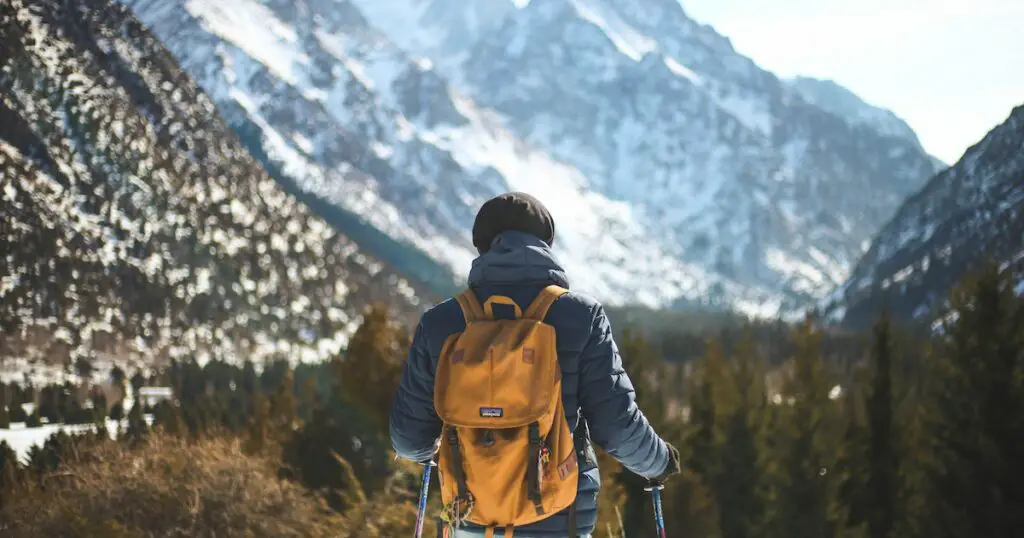
Choosing the Right Hiking Boots for Backpacking
Finding the perfect fit for your hiking boots is crucial when embarking on your first backpacking adventure.
As a beginner, it’s important to consider several essential features that will ensure comfort and durability throughout your trip.
Here are some tips to help you select the right hiking boots for a successful first-time backpacking experience:
Selecting Hiking Boots:
- Look for boots that provide excellent ankle support to prevent injuries on uneven terrain.
- Opt for waterproof or water-resistant boots to keep your feet dry during unexpected rain or wet conditions.
- Consider the weight of the boots – lighter options are often more comfortable and allow for easier movement.
Comfort and Durability:
- Prioritize finding boots with cushioned insoles and ample arch support to prevent foot fatigue.
- Choose breathable materials that allow air circulation, reducing sweat and odor.
- Ensure the boots have a sturdy outsole with good traction, providing stability on various surfaces.
Expert Advice:
- Seek guidance from experienced backpackers or outdoor specialists who can offer valuable insights into selecting suitable hiking boots.
- Visit a reputable outdoor gear store where knowledgeable staff can assist you in finding the perfect fit.
- Try on multiple pairs of boots and walk around in them to test their comfort and fit before making a purchase.
Remember, finding the right pair of hiking boots is essential as they act as your foundation while trekking through different terrains.
Ill-fitting or uncomfortable shoes can lead to blisters, sore feet, and overall discomfort. Take time to research, try on different options, and consult experts if needed.
With the right pair of hiking boots, you’ll be well-prepared for an enjoyable first-time backpacking experience!
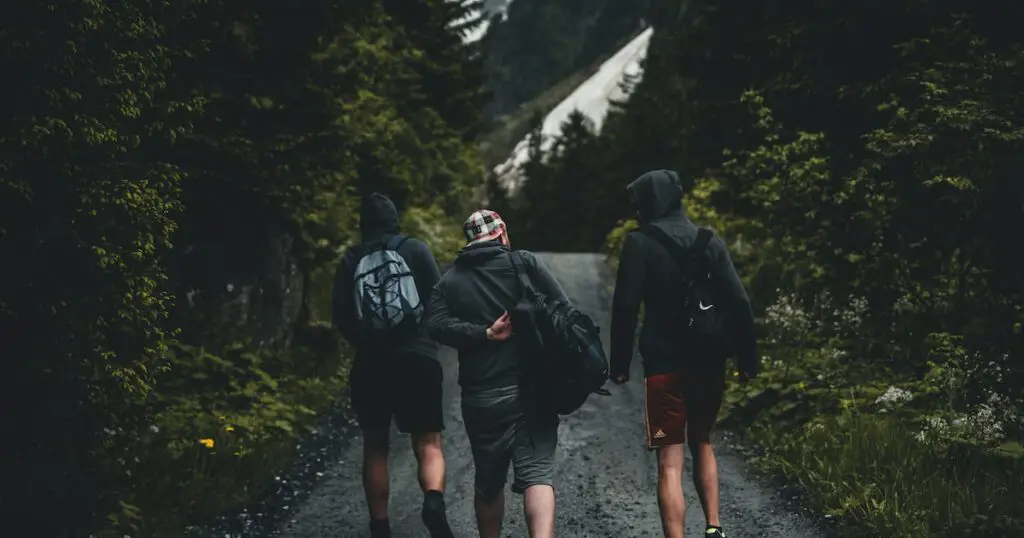
Building Fitness and Endurance for a Successful Backpacking Trip
To ensure a successful first-time backpacking adventure, it’s essential to prepare your body for the challenges that lie ahead.
Building fitness and endurance prior to setting off will help you tackle long hikes, elevation gains, and maximize your mileage while enjoying the breathtaking views.
Here are some effective tips to get in shape and increase stamina as a beginner backpacker.
Effective Fitness Routines
- Start with cardiovascular exercises like jogging or cycling to improve your overall endurance.
- Incorporate strength training exercises such as squats, lunges, and planks to build muscle strength.
- Don’t forget about flexibility! Stretching exercises like yoga can enhance mobility and prevent injuries.
Training Tips
- Gradually increase the intensity and duration of your workouts to avoid overexertion.
- Mimic backpacking conditions by hiking with a loaded backpack or using a weighted vest during your training sessions.
- Find local trails with varying terrains and elevations to simulate the challenges you may encounter on your backpacking trip.
Strengthen Your Body and Mind
- Engage in activities that challenge both physical and mental stamina, such as rock climbing or trail running.
- Practice proper nutrition by fueling your body with balanced meals consisting of carbohydrates, protein, and healthy fats.
- Familiarize yourself with food storage techniques, including dehydrated meals, which are lightweight options for backpackers.
By following these fitness routines and training tips, you’ll be well-prepared physically for your first-time backpacking adventure.
Remember to listen to your body throughout the process and make adjustments accordingly.
With increased fitness levels and endurance, you’ll be able to fully enjoy the beauty of nature while embarking on this exciting journey.
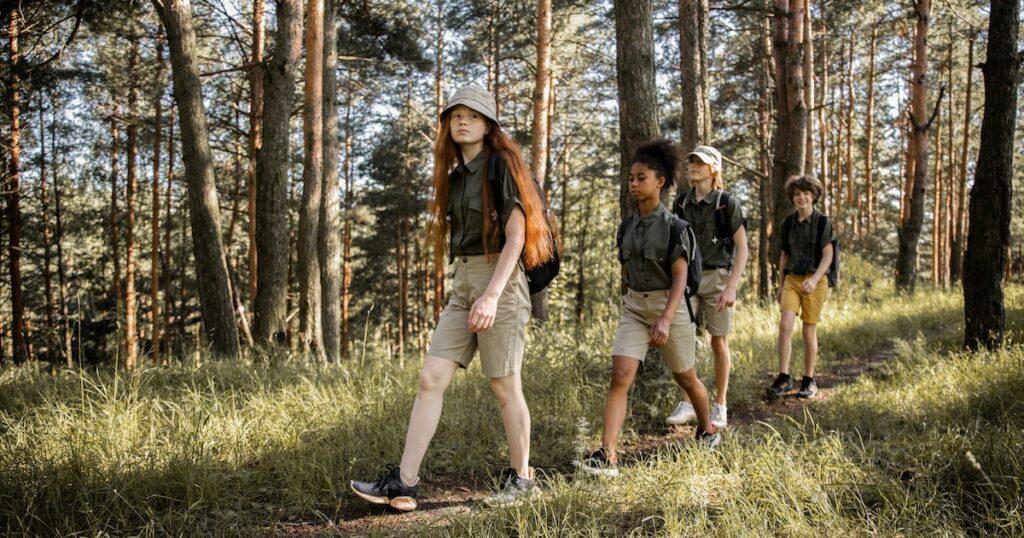
Selecting an Ideal Destination for Your First Backpacking Experience
To ensure a memorable and enjoyable first-time backpacking adventure, it’s crucial to choose the perfect destination.
Here are some factors to consider when selecting an ideal location tailored specifically to beginners’ needs:
Factors to Consider for Beginner Backpackers
- Terrain: Look for destinations with well-maintained trails and moderate terrain that won’t be too challenging for novice hikers.
- Distance: Opt for shorter trails initially, allowing you to gradually build up your stamina and experience without pushing yourself too hard.
- Accessibility: Choose destinations that are easily accessible, either by car or public transportation, making it convenient for you to reach the starting point of your hike.
- Weather: Check the weather conditions of potential destinations during the time you plan to go backpacking. Avoid extreme weather conditions or seasons that may pose risks.
Breathtaking Destinations Ideal for First-Time Backpackers
There are numerous incredible locations around the world that offer unforgettable experiences for novice adventurers. Here are a few popular trails and destinations worth considering:
- Appalachian Trail (USA): Stretching over 2,000 miles through 14 states, this trail offers breathtaking scenery and a variety of hiking options suitable for beginners.
- Camino de Santiago (Spain): This ancient pilgrimage route provides a well-marked path with plenty of accommodations along the way, making it a friendly option for first-time backpackers.
- Queen Charlotte Track (New Zealand): Located in the stunning Marlborough Sounds region, this track features diverse landscapes and comfortable lodges at regular intervals.
Remember, selecting an ideal destination is about finding a great option that aligns with your fitness level and preferences.
Research thoroughly, seek advice from experienced backpackers if possible, and don’t be afraid to step out of your comfort zone while ensuring safety remains a priority.

Embracing the Adventure of First Time Backpacking
It’s all about stepping out of your comfort zone and embracing the excitement that comes with it. It might feel a bit scary at first, but trust me, the thrill is worth it!
Overcoming fears and embracing new experiences
Many backpackers experience fears and doubts before embarking on their initial backpacking trip. But don’t let those worries hold you back!
Embrace the opportunity to overcome your fears and embrace new experiences that will leave you with unforgettable memories.
How to fully immerse yourself in the adventure
To fully immerse yourself in the adventure of first-time backpacking, you need to approach it with an open mind.
Be willing to try new things, meet new people, and explore unfamiliar places. Remember, this is your chance to break free from routine and discover the world around you.
Embrace the unknown: tips for making the most out of your inaugural backpacking experience
- Research backpacking trails: Look for trails suitable for beginners that offer beautiful scenery and manageable distances.
- Pack smartly: Invest in lightweight gear and pack essentials like a tent, sleeping bag, food, water filter, and navigation tools.
- Start with day hikes: If solo backpacking feels overwhelming initially, begin with day hikes to build confidence.
- Connect with other backpackers: Join online forums or local hiking groups to gain insights from experienced backpackers.
- Take safety precautions: Learn basic wilderness survival skills, inform someone about your trip plans, carry a first aid kit, and follow Leave No Trace principles.
Remember, everyone starts somewhere! Your first-time backpacking experience may have its challenges but embrace them as opportunities for growth and adventure.
So get out there and create memories that will last a lifetime!
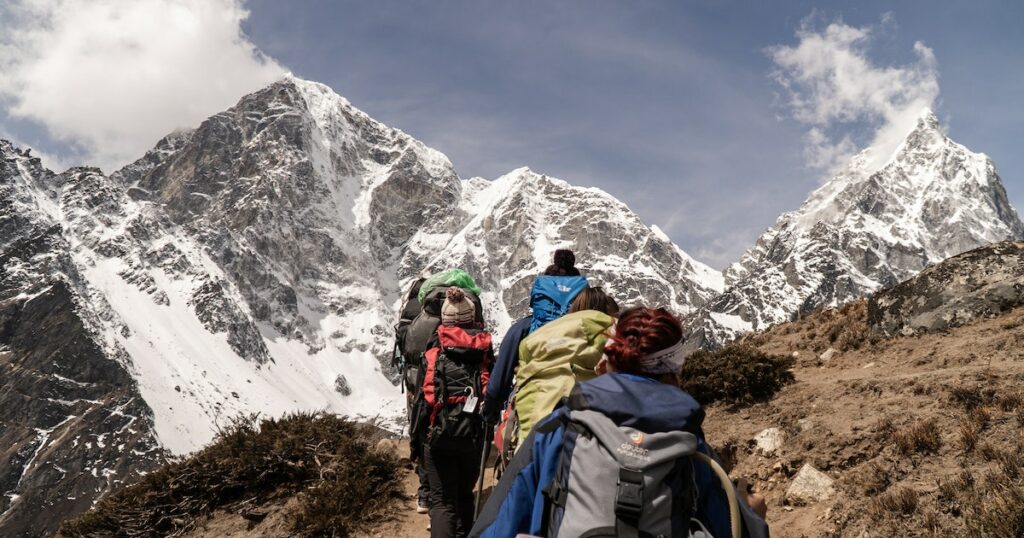
Conclusion
In conclusion, embarking on your first backpacking adventure can be an exhilarating and rewarding experience.
By following the essential tips for beginner backpackers, avoiding rookie mistakes, planning thoroughly, choosing the right gear and equipment.
Building fitness and endurance, selecting an ideal destination, and embracing the adventure, you can set yourself up for a successful trip.
Remember to start slow and gradually increase the difficulty level of your hikes to build up your stamina.
Don’t forget to research and invest in high-quality hiking boots that provide comfort and support for long hours on the trail.
As you prepare for your first time backpacking trip, keep in mind that safety should always be a top priority.
Make sure to pack essentials such as a first aid kit, navigation tools, extra food and water, emergency shelter, and clothing suitable for various weather conditions.
Familiarize yourself with Leave No Trace principles to minimize your impact on nature.
FAQ
1. What are some common rookie mistakes to avoid on a first backpacking trip?
Some common rookie mistakes include overpacking unnecessary items, not testing gear beforehand, failing to check weather conditions in advance, neglecting proper hydration and nutrition during the hike, not informing someone about your itinerary or expected return time.
2. How do I choose the right hiking boots for backpacking?
When choosing hiking boots for backpacking trips, consider factors such as ankle support, traction on different terrains (especially if you plan on encountering steep or slippery trails), waterproofness (if necessary), durability for extended use.
3. How can I build fitness and endurance before my first backpacking trip?
To build fitness and endurance before a backpacking trip:
Start with regular cardio exercises like walking or jogging.
Gradually increase intensity by incorporating uphill climbs or stair workouts.
Carry a weighted backpack during training hikes to simulate actual conditions.
Engage in strength training exercises to build overall body strength.
4. How do I select an ideal destination for my first backpacking experience?
When selecting a destination, consider factors such as trail difficulty level, distance from your location, weather conditions during your planned trip dates, availability of water sources and campsites along the trail, and any permits or regulations required for hiking in the area.
5. What are some essential items to pack for a backpacking trip?
Essential items to pack for a backpacking trip include a tent or shelter, sleeping bag and pad, cooking equipment and utensils, food and water supplies, navigation tools (map and compass), appropriate clothing layers, headlamp or flashlight with extra batteries, personal hygiene products, emergency whistle or signaling device.

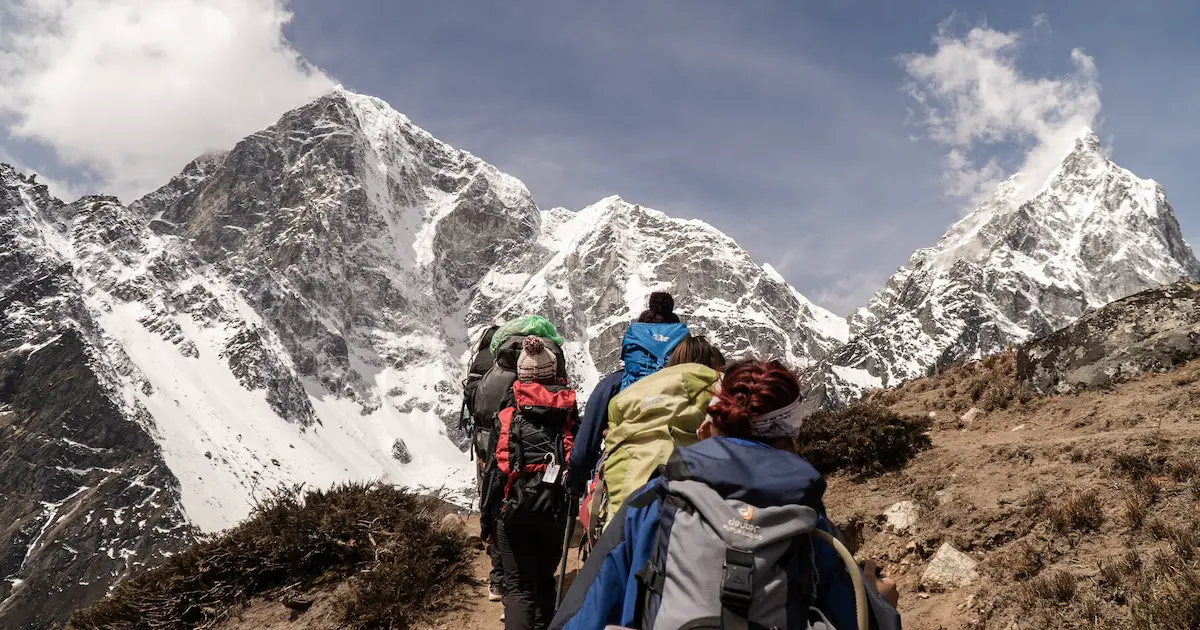

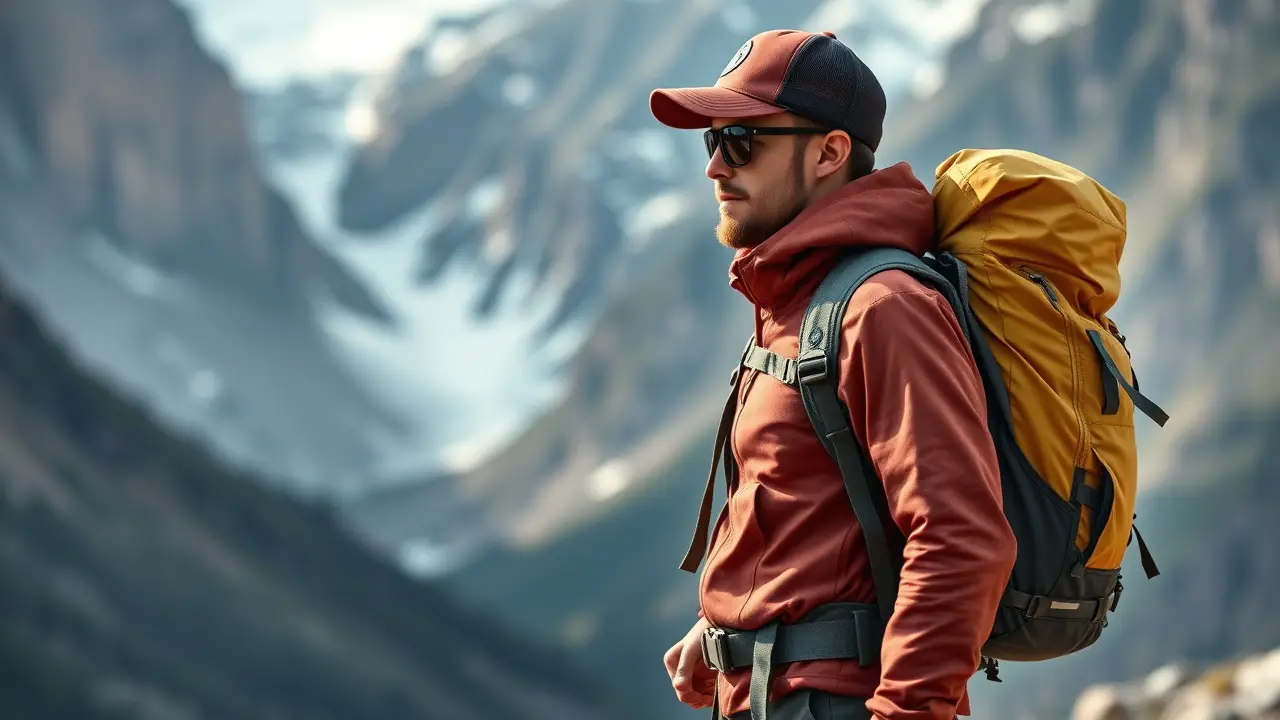
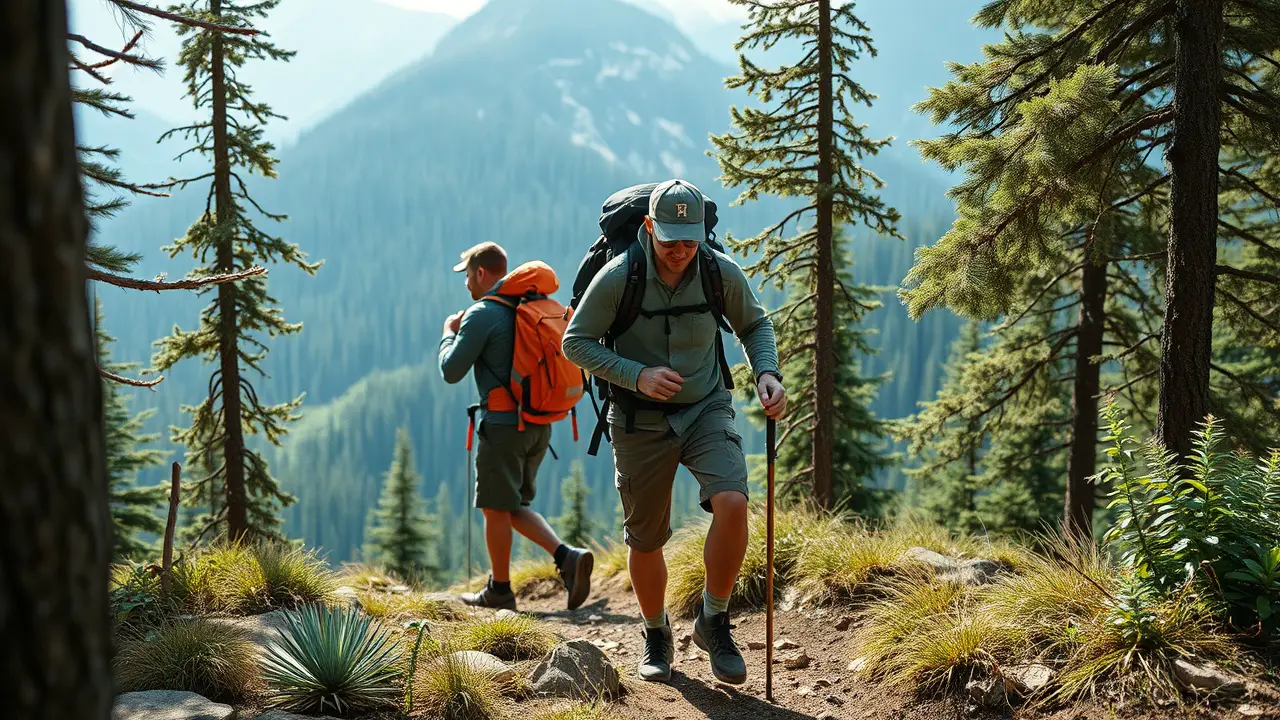
Leave a Reply